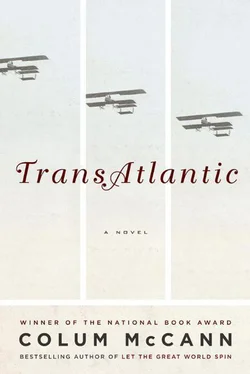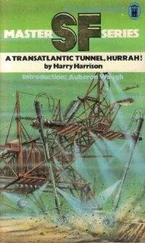Douglass found himself happily besieged. None of the formality of the Webb household. The talk spun into incredible tangents. Seldom before had all the vectors of the conversation gone through him alone. Webb watched from the far end of the table.
Part of Douglass wondered if they were laying a trap for him, but, as the hours went on, his ease deepened.
He was surprised to see that the women remained at the table alongside the men. Isabel stayed quiet most of the time. She ate sparingly. She wet her finger and picked the crumbs from her plate. There was a shyness about her, but whenever she entered the conversation she seemed to do so on the tip of a knife blade. She was quick to draw blood and then retreat. Douglass had never seen anyone quite like her before. He found himself discombobulated when, in a conversation about Charles Grandison Finney, she turned towards him and asked how exactly Mrs. Douglass felt about the issue of public prayer.
He felt a rush of warmth to his collar.
— Mrs. Douglass?
— Yes, she said.
— Her position is quite clear on all such matters.
He saw Webb move slightly in his chair. The Irishman was chewing at the edge of his dinner napkin.
— She would no doubt be aligned, said Douglass.
He was sure Isabel had not meant to embarrass him, but the heat seared him. A seep of sweat at the brow. He balanced a cup of tea on the saucer without it rattling, then pronounced the meal delicious, excused himself, moved towards the stairs, touching Webb’s shoulder as he went.
He had not written to Anna or his children in a few days. He would do so straightaway.
Upstairs, he caught sight of himself in the looking glass. His hair had grown higher, thicker, more Negro. He would let it be.
There was no lock on the door. He wedged a chair against the door handle. He unwrapped the barbells from the shirts in which he hid them. There were times he was still walking into a church in Tuckahoe. The wooden crossbeams. The singular plane of light sloping east to west during morning services. The glimpse of a red-tailed hawk arcing out through the window. The high sound of the organ. The smell of grass carried in through the wide white doorway.
Anna might cherish hearing the letters read to her for an evening or two, but soon enough they would be burned. It gladdened him, really, that the letters would become smoke: it was so much of what happened to one’s own history.
THE CITY WAS dark, yet it didn’t press down on him quite like Dublin had. He began to feel that, even in the gloaming, things had opened up. The church bells rang high and brassy. The markets on Saint Patrick’s Street hummed. Swans glided under the footbridges that crisscrossed the city. Shandon Steeple stood out against the sky. Even the slums seemed more forgiving. It was a city that gave alms. The poor were still legion, but he could walk with the Jennings sisters along the quays and the beggars would leave them alone. Men carried pieces of lit clay in their hands. They offered Douglass a pull of their pipes, clapped him on the shoulder.
There was something in the music of the accent that Douglass liked: it was as if the Cork people put long lazy hammocks in their sentences.
He was happy when Webb announced, after six long days, that he would leave Cork on urgent business. Both men were glad to be rid of one another. Douglass watched the carriage move away and felt a bolt of freedom. It was the first time in ages that he felt truly alone. At ease in the ornate looking glass.
It must be said that in my time here in Ireland my heart feels stirred. Instead of the bright, blue sky of America, I am covered with the soft, grey fog of the Emerald Isle. I breathe and lo! the chattel becomes a man! Though I have seen much that would make my own people tremble, I am encouraged to exercise my true and proper voice. I breathe the sea air freely. And while there is much I observe to make the heart heavy, I am at least temporarily without chains .
HE WALKED ALONG the River Lee, his hands clasped behind his back. A new walk for him. Large and public. The attitude of a thinking man. He enjoyed the pose, found it conducive to the idea of himself. He heard the clopping of a horse behind him on the cobbles, the soft sound of a harness creaking. Isabel descended the horse, walked alongside him, her hand careful at the horse’s neck. The sheen of sweat on the animal’s body.
Barges plied along the river. Corn barges. Barley barges. Cattle barges. Salt barges. Pig barges. Sheep for the slaughterhouses farther downriver. Firkins of butter. Oatmeal. Flour bags. Egg boxes. Baskets of turkeys. Canned fruit. Bottled soda and minerals.
They watched the river of food in silence. Gulls busied themselves behind the boats, swooping every now and then to claim what they could.
They walked along by a merchant-marine shop, a bookseller’s, a tailor shop. Farther down the quays she pulled the horse close to her. As if it might offer protection.
— I could not find her.
— Excuse me?
— That woman you met upon the road.
For a brief moment he was not sure what Isabel was talking about, an incidental skim of words across the surface of the day, but then he caught himself, said it was a great shame, but he was sure the child was buried by now.
— You did what you could, said Isabel.
He knew it was not so: he had done nothing at all. He had borne witness and stayed silent.
— There’s nothing worse, she said, than a small coffin.
He juggled the words in his mind for a moment. He nodded. He liked her. He thought of her, increasingly these past few days, as a younger sister. It was odd to think so — her green eyes, her awkward walk, the rustle of her humble dresses — but, that’s what she was: sisterly. Hovering. Curious. Intrusive. She explored new ideas with him. There were few limits. What did he think of the notion of Liberia? What was the gulf between revenge and justice? Did he have a plan with Garrison to send the money back from churches that embraced slaveholders?
She was quieter when the talk returned to what was happening around them. She stopped midsentence. She worried the bracelet on her left arm. She gazed into the distance. Her voice caught.
There was enough food in the land to feed Ireland three or four times over, she said. It was being shipped across to India, China, the West Indies. The exhaustion of empire. She wished there was something she could do about it. The truth could not be preserved by silence. Her own family had warehouses full of food farther down the river. Bottles of vinegar. Stocks of yeast. Malting barley. Even crates of fruit jam. But it could not just be given away. There were laws and customs and issues of ownership. Other complexities, too. Business alliances. Extended contracts. Taxation. The demands of the poor. The creation of moral illusions.
It struck him that Isabel carried the wounds of privilege. Perhaps, then, he did also? He leafed through the New Testament. From everyone who has been given much, much will be demanded . And yet if he himself spoke out on behalf of the poor Irish, what would happen? What language could he create for this? To whom would he speak?
The politics still confounded him: who was Irish, who was British, who was Catholic, who was Protestant, who owned the land, whose child stood rheumy-eyed with hunger, whose house was burned to the ground, whose soil belonged to whom, and why? The simple way to see it was that the British were Protestant, the Irish were Catholic. One ruled, the other lay underfoot. But where did Webb fit in? And where did Isabel fit in? He would gladly have allowed himself to align with the desires of freedom and justice, but it was to his own known cause that he had to remain entirely loyal. Three million voices. He could not speak out against those who had brought him here as a visitor. There was only so much he could take upon himself. He had to look to what mattered. What was beyond toleration was the ownership of man and woman. The Irish were poor, but not enslaved. He had come here to hack away at the ropes that held American slavery in place. Sometimes it withered him just to keep his mind steady. He was aware that the essence of proper intelligence was the embrace of contradiction. And the recognition of complexity was to be balanced against the need for simplicity. He was still a slave. Fugitive. If he returned to Boston he could be kidnapped at any time, taken south, strapped to a tree, whipped. His owners . They would make a spectacle of his fame. They had tried to silence him for many years already. No longer. He had been given a chance to speak out against what had held him in chains. And he would continue to do so until the links lay in pieces at his feet.
Читать дальше












